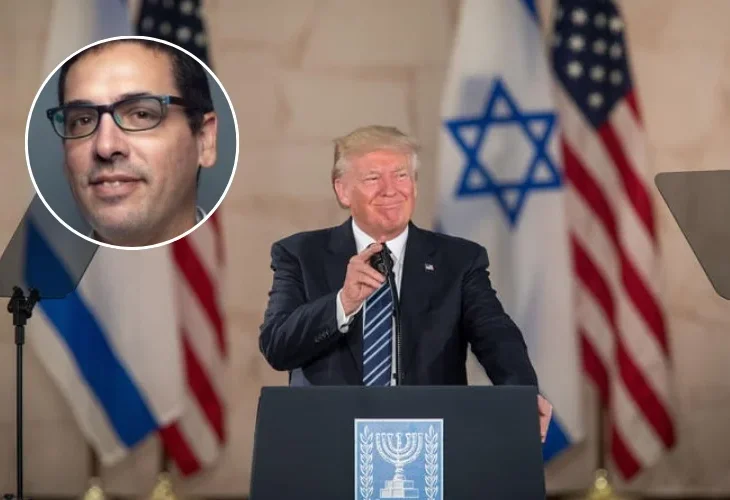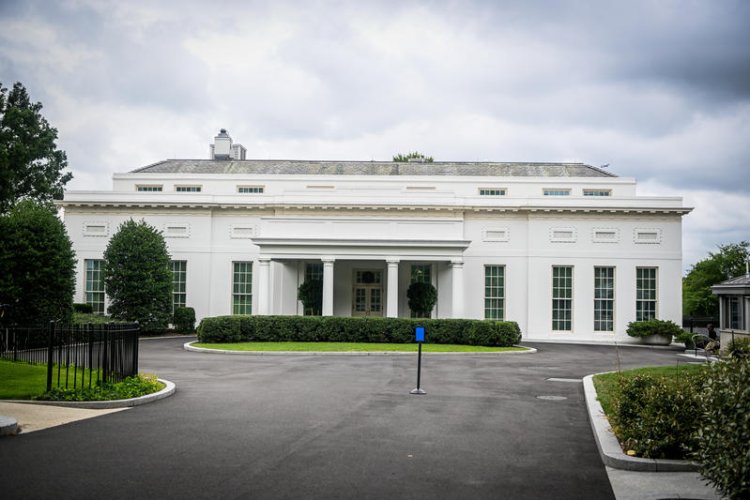Trump's New Era: Potential Shifts in US-Israel Relations
Will the US and Israel collaborate to dismantle Iran's nuclear ambitions, and is normalization with Saudi Arabia imminent? Dr. Kobi Bereda explores.
 Trump (Photo: Flash90). In the circle: Dr. Kobi Bereda (Photo: Tal Gevoni).
Trump (Photo: Flash90). In the circle: Dr. Kobi Bereda (Photo: Tal Gevoni).Donald Trump, a fascinating and controversial political figure, has returned to the presidency with an ambitious agenda that has drawn significant global interest, particularly in Israel. How impactful will his influence be on Israel, and can we expect a change in his approach towards it compared to his previous term? We discussed with Dr. Kobi Bereda, an expert in US political history.
During the inauguration, the outgoing president Joe Biden welcomed Trump with "Welcome home." Is the White House truly home for such a complex personality like Trump?
"Apparently so. In the last elections, Trump achieved a larger result compared to his previous run, this time winning the popular vote. Americans saw him as the most worthy and suitable for the role; they expressed this in the Republican primaries and later when he faced Kamala Harris."
Unlike Trump's previous term, are there any changes expected in his relations with Israel?
"It's highly situational. The Republican Party has two main factions: the evangelicals and MAGA ("Make America Great Again"). Unlike the evangelicals, MAGA is a very nationalist faction advocating for minimal foreign engagement and a focus on domestic affairs. Notably, some members exhibit strong anti-Israel, even distinctly antisemitic, tendencies. These are primarily opinion leaders and social media personalities with millions of followers exposed to critical and antisemitic content regarding Israel.
"Trump might be influenced by the MAGA faction and decide not to renew security aid to Israel. It's no secret that Trump recently stated he would stop giving financial aid to world countries, offering only loans, and it's uncertain if he'd make an exception for Israel. This is a significant shift from his previous term."
 The White House (Photo: flash90)
The White House (Photo: flash90)
Trump's Moment of Glory
Bereda, a lecturer at the Holon Institute of Technology (HIT), studied Trump's colorful and charismatic persona for an extended period. He compiled his findings in his book, "The Key to Understanding Donald J. Trump," analyzing Trump's unconventional personality within the presidential landscape. "Donald Trump has one interest in life, that interest is Donald Trump," Bereda believes. "Understanding what interests him allows us to analyze future relations with him.
"In his inauguration speech, Trump declared he would be judged by the peace he achieved, not the wars he started. It's quite possible Trump will aim for a ceasefire in Gaza, a comprehensive arrangement for hostage return, and a peace agreement with Saudi Arabia. Whether this is good or not—opinions differ. Every Israeli citizen will have a different answer. Some may say Trump won't allow us to eliminate Hamas, instead enabling them to maintain power. Others might argue that the agreement with Saudi Arabia is significant, enabling a regional alliance against Iran."
Realistically, to what extent will Trump take on Israel as a project and attempt to solve its complex challenges?
"He won't try to solve all of Israel's crises. Trump is interested in receiving a Nobel Peace Prize, intending to secure it through a peace agreement between Israel and Saudi Arabia. Trump views himself as a great historical leader who will succeed where others have failed—in establishing normalization between the two nations.
"In this scenario, it's crucial to understand: Trump can't broker a peace deal while fighting in Gaza continues. To end the war, he will need to pressure Hamas."
Does Hamas genuinely care about Trump?
"Hamas is quite concerned about him. Trump can exert significant pressure on Qatar, Turkey, and Egypt, who are Hamas's players on the financial stage. A US military strike doesn't interest Hamas much, as they've endured enough from us without yielding. However, if the countries funding Hamas threaten them, they'll concede."
Bereda asserts that Trump's Nobel Peace Prize ambition not only drives the prospective Saudi agreement but also his energetic push for the hostage deal. "He did all this to achieve a fleeting moment of fame known as 'The Reagan Moment.' The former US President Ronald Reagan is the figure Trump admires most in the world, desiring something akin to Reagan's accomplishment when, only an hour after his inauguration, US hostages in Tehran were released. Now, Trump too has had his 'Reagan Moment' and entered history."
Israel's Fortunate Position
Iran's nuclear program poses an existential challenge for both Israel and the US. Will we witness cooperation between the two nations to thwart it this time?
"That's a good question. Trump might go one of two ways: military force or diplomatic channels. Generally, Trump dislikes using force, though he's not averse to it, given certain situations. An example is the assassination of Qassem Soleimani through an air strike in Iraq. Also, when the FBI uncovered a plot against his life, Trump left a directive to nuke Iran if they succeeded in assassinating him. But these are isolated instances, as Trump is generally less inclined toward military action.
"For this reason, I wouldn't be surprised if one morning we wake to find US military forces bombed Iran's nuclear facilities. Equally, I wouldn't be shocked if we hear Trump signed a diplomatic agreement with the Iranians. Iran's nuclear program is truly an existential threat to both the US and Israel, making cooperation between the two plausible."
US-Israel relations during the Trump era differ from typical US relations with other countries. What underlies this?
"Israel is fortunate that Trump's inner circle is filled with Israel supporters. Take, for example, one of his major donors, Miriam Adelson, who holds citizenship in both Israel and the US. She wields significant influence over him, funding him generously. The worldview and religious beliefs of the Trump entourage encourage supporting the State of Israel, a core factor in his good relations with Israel."
President Trump also shares a friendship and closeness with Prime Minister Benjamin Netanyahu, though their relationship has experienced ups and downs. "Trump is still upset that Netanyahu called to congratulate Biden when elected, despite being the last Western leader to do so," Bereda recalls. "Whether Netanyahu will have to endure from him again is a question that awaits an answer as we watch how things unfold shortly."
If another politician were leading Israel, without taking sides, would US-Israel relations under Trump look different?
"Not long ago, a recording of Trump saying 'I love the tall general with the blue eyes' surfaced. He was referring to Gantz."
Ending Antisemitism
Another initiative expected to gain emphasis during Trump's current term is his plan to eliminate antisemitism across the US. "Trump announced he would expel students supporting terrorism and dismantle antisemitic student cells in universities. It's a move Biden didn't pursue, even as we witnessed severe antisemitism in these centers on his watch. Trump plans to lead efforts against antisemitism, promising swift action," Bereda asserts.
Is this move driven by a love for Israel or animosity towards the opposing side?
"Both. If you can achieve two outcomes with one move, why choose just one reason?"

